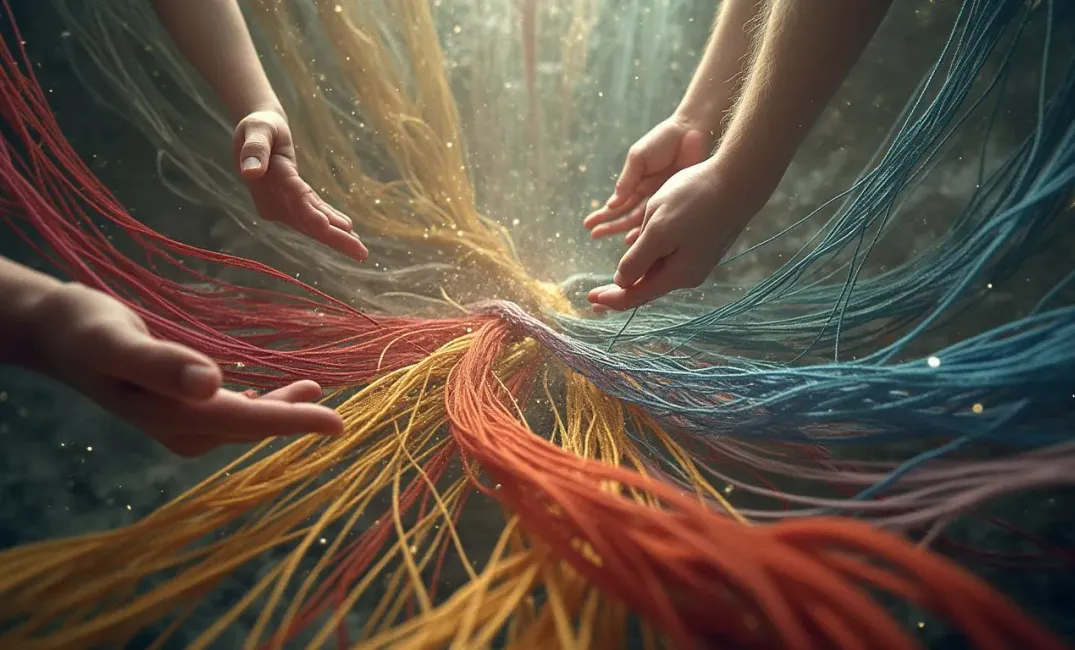Introduction: The Dual Nature of Humanity
"For the strength of the Pack is the Wolf, and the strength of the Wolf is the Pack." — Rudyard Kipling
Human history is marked by a dual narrative—a story woven with threads of conflict and cooperation. These two elements do not merely coexist; they are deeply interwoven, shaping and being shaped by the intricate tapestry of human civilization. As agents of change, conflict and cooperation have fostered growth, transformation, and enlightenment while simultaneously becoming sources of strife, destruction, and division.
Today’s exploration reveals how the interplay between conflict and cooperation has driven human progress, providing crucial lessons for future societies. By examining pivotal moments and themes that capture this dual nature, we uncover insights into humanity's past and its guiding compass for future harmony and reconciliation.
The Origins and Evolution of Human Conflict
The Seeds of Strife in the Human Psyche
- Primal Instincts: From ancient territorial disputes among early human groups to more complex societal conflicts, human psychology harbors innate inclinations toward aggression and competition. These instincts, while rooted in survival mechanisms, foster divisions when unchecked by reason and empathy.
- Cultural Narratives and Identity: Cultural identity can both unite and divide. Throughout history, narratives grounded in ethnicity, religion, nationalism, and ideologies have perpetuated conflict by asserting exclusivity over shared resources and equitable governance.
Historical Milestones of Conflict
- The Birth of War: Archaeological evidence suggests warfare has been part of human societies for millennia, with large-scale clashes shaping civilizations' rise and fall—from the territorial expansions of ancient empires to feudal skirmishes of medieval Europe.
- Industrialization and Global Conflict: The Industrial Revolution and the advent of mechanized warfare reshaped global conflict, intensifying its destructive potential. The world wars epitomized this new paradigm, leaving indelible marks on political, social, and moral landscapes.
The Role of Cooperation in Human Progress
The Innate Capacity for Collaboration
- Evolution of Social Cooperation: Despite the propensity for conflict, humans exhibit a profound capacity for cooperation—rooted in evolutionary successes that favored communal living, shared labor, and mutual protection, empowering societies to thrive.
- Cultural and Technological Innovations: Cooperation is foundational in human creativity and innovation. Language, art, science, and technology have flourished through collective efforts, evidenced in collaborative endeavors like the Renaissance, the Scientific Revolution, and the Digital Age.
Historical Pinnacles of Human Cooperation
- Formation of Empires and Alliances: The formation of empires and political alliances illustrates cooperation's potential to unify diverse peoples, pooling resources and knowledge for mutual benefit. The Roman Empire and the United Nations are exemplary models of this unification.
- Globalization and Interconnectedness: Recent technological advancements and globalization have linked societies, fostering cooperation on unprecedented scales in trade, culture, and knowledge while presenting challenges in preserving local identities and equitable access.
The Interplay Between Conflict and Cooperation
Conflict as a Catalyst for Cooperation
- Conflict-Induced Innovations: Historically, conflict has spurred technological and medical advancements. The exigencies of war have accelerated innovation as societies endeavor to gain advantages over opponents, leading to niche technological breakthroughs like radar and antibiotics.
- Reconciliation and Peacebuilding: Many past conflicts have concluded with shifts toward cooperative frameworks, such as the post-World War II reconstruction efforts that laid the groundwork for long-lasting peace in Europe through economic collaboration and unity.
Balancing Paradoxes
- Dual Nature of Progress: The tension between conflict and cooperation reflects humanity's dual nature, resulting in a complex dance that demands continuous negotiation and redefinition of social contracts and ethical norms.
- Cultural and Ethical Dialogues: The dialectic between local identities and global cooperation provides fertile ground for dialogues addressing transnational challenges like climate change, pandemics, and economic disparities, necessitating shared values and unified action.
Lessons from History: Striving Toward Future Harmony
Education and Empathy as Catalysts
- Fostering Empathic Understanding: Education that cultivates empathy allows future generations to comprehend diverse perspectives, encouraging the resolution of conflicts through dialogue and understanding, as illustrated by the transformative success of the Truth and Reconciliation Commission in South Africa.
- Learning from Multiculturalism: Embracing multicultural educational frameworks prepares societies to navigate complexities by valuing diversity and harnessing collective wisdom and creativity in problem-solving.
Cooperative Governance and Global Challenges
- International Cooperation: As global challenges transcend borders, cooperative governance that harnesses multilateral partnerships can introduce innovative solutions, embodying shared values and collective responsibility for humanity's welfare.
- Harnessing Technology for Unity: In the digital revolution, technology is a powerful tool for fostering collaboration, breaking down barriers, and building inclusive networks that promote global citizenship and progress.
Conclusion: Forging a Harmonious Future
"We are caught in an inescapable network of mutuality, tied in a single garment of destiny." — Martin Luther King Jr.
Humanity's duality of conflict and cooperation shapes its evolutionary saga, embodying the wars' havoc and the peace treaties' hopes. The tensions between these opposing forces provide fertile ground for discovery and enlightenment, offering humanity unlimited opportunities to craft a richer, more harmonious future.
By acknowledging and understanding the interconnected threads of conflict and cooperation, humanity leverages past wisdom to nurture common ground, weaving a future reflective of mutual respect, shared responsibility, empathy, and innovation.
As we strive forward, guided by the lessons of history, the enduring narrative of harmony—attained through the delicate balance of conflict and cooperation—illuminates the resilience of the human spirit, a beacon lighting the way toward an equitable and sustainable global society. For in this eternal quest, cooperation is both a fragile triumph and an enduring promise, empowering us to transcend divides and embrace a future of unity and progress.
CONFLICT, HUMANITY, EDUCATION, GLOBAL CHALLENGES, PROGRESS, EMPATHY, HISTORY, INNOVATION, COOPERATION

